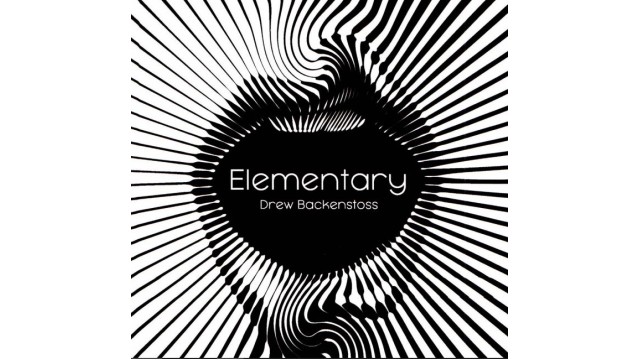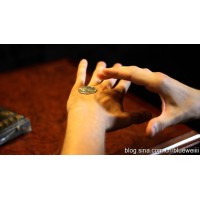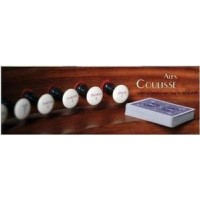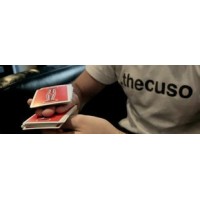Elementary by Drew Backenstoss
- Product Code: I2039B
- Reward Points: 20
- Availability: In Stock
- $8.99
-
$4.99
- Price in reward points: 499
What you get:
eBook with all bonus routines
Not included:
Web app
access to facebook group
This contains nearly 70 pages of bonus content where I share six additional variations of Elementary. These are complete routines that provide a wealth of enhancements and subtleties built off of the core method(s). You will learn a spectator-as-mind reader variant; a handling that uses two participants for a double PIN reveal; a version that links two people on opposite ends of a phone call in an inexplicable way; and two versions that are perfectly suited for stage performances.
The hardback book also includes a bonus concept I call Amalgamation. This is another one of my favorite prop-less techniques. It's an extremely deceptive and reliable verbal strategy to force thoughts ranging from names to countries to drawings (and more). This fits perfectly alongside the overall performance aesthetics and philosophies found in the Elementary system(s), so I decided it would make a worthy addition to the project.
The content of this book might surprise some. If you're familiar with my work, you'll know that I primarily rely on classic methods within my paid performances. I'm not opposed to leveraging concepts from the world of prop-less mentalism, but I typically do so only to enhance more sure-fire material. I rarely ever perform something solely built on prop-less methods. One routine in my repertoire breaks that mold though.
What is the routine? In short, it's a PIN divination that I call Elementary.
I readily admit that there's an abundance of such routines on the market but, in my eyes, nearly all of them fall short of the mark. Most don't FEEL like "genuine mind reading" for one or more of the following reasons: they suffer from a heavy (and obvious) mathematical procedure; they play out like a game of 20 Questions due the amount of fishing required; they make no sense from a presentational point of view; they are too cumbersome for the participant and/or performer to navigate during the heat of performance.
Elementary, in my humble opinion, addresses those problems directly.
IMAGINE THE FOLLOWING SCENARIO: You offer to demonstrate how your skills might allow you to pull an ATM PIN from someone's mind. Out of respect for the participant's privacy, you request that he think of a substitute PIN. You even invite him to change his mind several times before settling on a four digit number. This new PIN is never written down or spoken aloud until the successful conclusion of the performance wherein you divine the number.
Here are a couple points that are worth emphasizing:
- There is no math involved in the process used to generate the substitute PIN. The procedure in play is minimal, feels extremely fair and is completely motivated.
- The PIN creation process takes approximately one minute - around the same time needed for traditional peek approaches.
- The system delivers you most (if not all) of the PIN within seconds and WELL BEFORE the participant could fathom that you could possibly know anything. This allows you to relax and enjoy the performance along with everyone else.
- This is one of those rare routines where the presented method is so closely aligned with the real method that it FEELS authentic to all involved (including you as the performer). Don't misunderstand me, you aren't actually reading the participant's mind, but it almost feels that way!
- The method works in any language, anywhere in the world.
- Once you become comfortable with the scripting and system(s), this is just as reliable as any of your favorite peek strategies. Speaking personally, over the last two years I have only used peeks for names, drawings, memories and the like - when I want to reveal a PIN, I use Elementary and the number only ever exists in the participant's mind.
- Most importantly, please understand that this is not "self-working" and you won't be performing this within minutes of learning it. To become fully comfortable with the system(s), it will take time and effort. That said, the work involved is comparable to learning a star sign anagram. Once it clicks in your mind, you'll find that you aren't relying on memory as much as logic and deduction.
Reviews (0)
Related Products
Open Warp by Zoyu
" This is the Best card warp I've ever seen, You don't even need to fold the cards... it's direct, v..
$2.99 $5.99
Shooting Star by G
As magicians we forget magic is not for us. It's to leave our audience with a feeling or memory..
$1.99 $5.99
Ephemera by Dennis Kim
Special Forces operators have a slogan: "Slow is smooth. Smooth is fast." The sa..
$2.99 $5.99
Card To Pocket by The Other Brothers
Imagine taking a card and ((record scratch)) ... Why do all magic effects get sold in..
$1.99 $5.99
Card Magic Course Zoom Live (Week 3) by Alex Pandrea
Week 3 - Hard Hitting EffectsAfter building our foundation with the previous 2 weeks, we will now mo..
$0.99 $6.99
Recommend
One Hand Top Palm by Alex Linian
Single Hand steal Top card Vanishing Inc Alex Linian One Hand Top I Alex Linian 's handling of the ..
$1.99 $4.99
Fingertip Miracle by Alex Linian
Alex Linian - Fingertip Miracle Traditional snap change the ultimate improvement ! ..
$1.69 $3.98
Complete Mind Therapy (Stage Hypnosis) by Alex Leroy
Alex LEROY - Complete Mind Therapy (Stage Hypnosis)PDF..
$3.99 $7.48
Hashtag by Alex Hansford
Hashtag by Alex Hansford Alex Hansford had taken something old, something new and something bor..
$1.99 $4.99
Velvet Vanish by Alex Geiser
Alex Geiser - Velvet Vanish Alex Geiser at The Blue Crown Magic website launched a disappearing c..
$1.99 $4.99
The Prodigy by Alex Geiser
Alex Geiser - The Prodigy Xu Jiumei saw magic in the coin market , glad The Blue Crown website do..
$1.99 $4.99
Mirage by Alex Geiser
Theory11 - Alex Geiser - MiRAGE Slowly waving your hand , coins intuitive disappeared. T11 The ..
$1.99 $5.99
Lynel Vanish by Alex Geiser
Alex Geiser - Lynel Vanish With just a slow wave, one coin visually vanishes. Your hands ne..
$1.69 $3.98
Intensity by Alex Geiser
practices Alex Geiser - Intensity Demonstration effect : The Blue Crown magic download site laun..
$1.99 $4.99
Tahoe Sessions (1-4) by Alex Elmsley
Alex Elmsley - Tahoe Sessions (1-4) Alex Elmsley is no doubt that the modern master of close-up mag..
$1.99 $4.73
Utopian Prediction by Alex Blade
Alex Blade - Utopian PredictionPDFEveryone desires something. Whether it be the ability to fly or si..
$1.99 $4.99
Coulisse by Alex
Alex - Coulisse Magical Sleight network 's new brand shift teaching practices . Description : Learn..
$1.99 $4.99
Poco by Alejandro Portela
Alejandro Portela - Poco Poco is a new card flourish from Spanish Magician and Cardistry expert A..
$1.99 $4.99
Joz by Alejandro Portela
Dan & Dave Alejandro Portela - JOZ http://store.dananddave.com/joz-ale..
$1.99 $4.99
Aldo Colombini Penguin Live Online Lecture
If you could ask ONE question to one of the world's best card magicians, what would it be? In..
$1.99 $4.68
Farewell Tour Lecture (2013) Part2 by Aldo Colombini E Raquel
Aldo Colombini moved to the United States from Italy in 1993. He has performed in over 60 countries ..
$1.99 $4.99






















